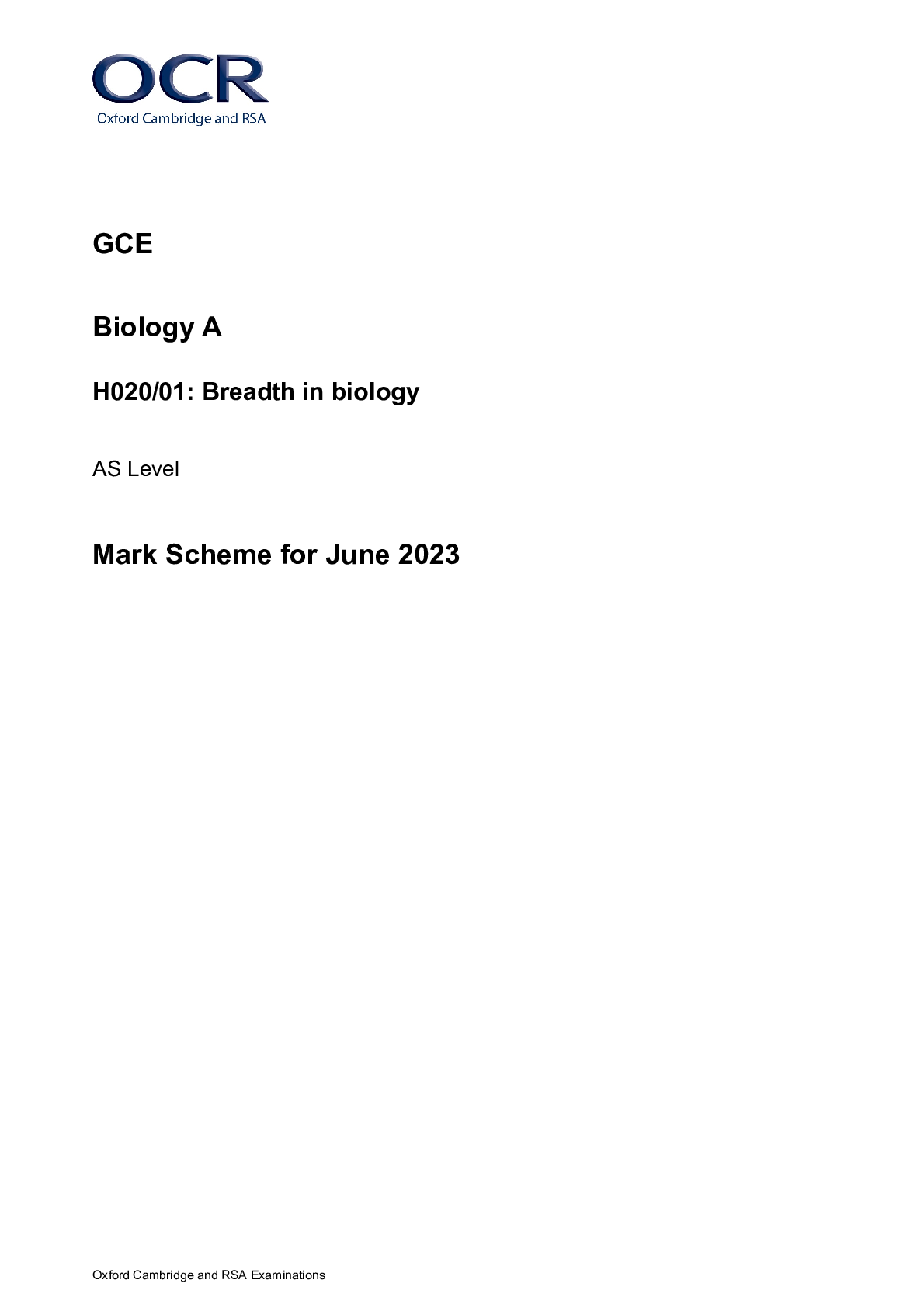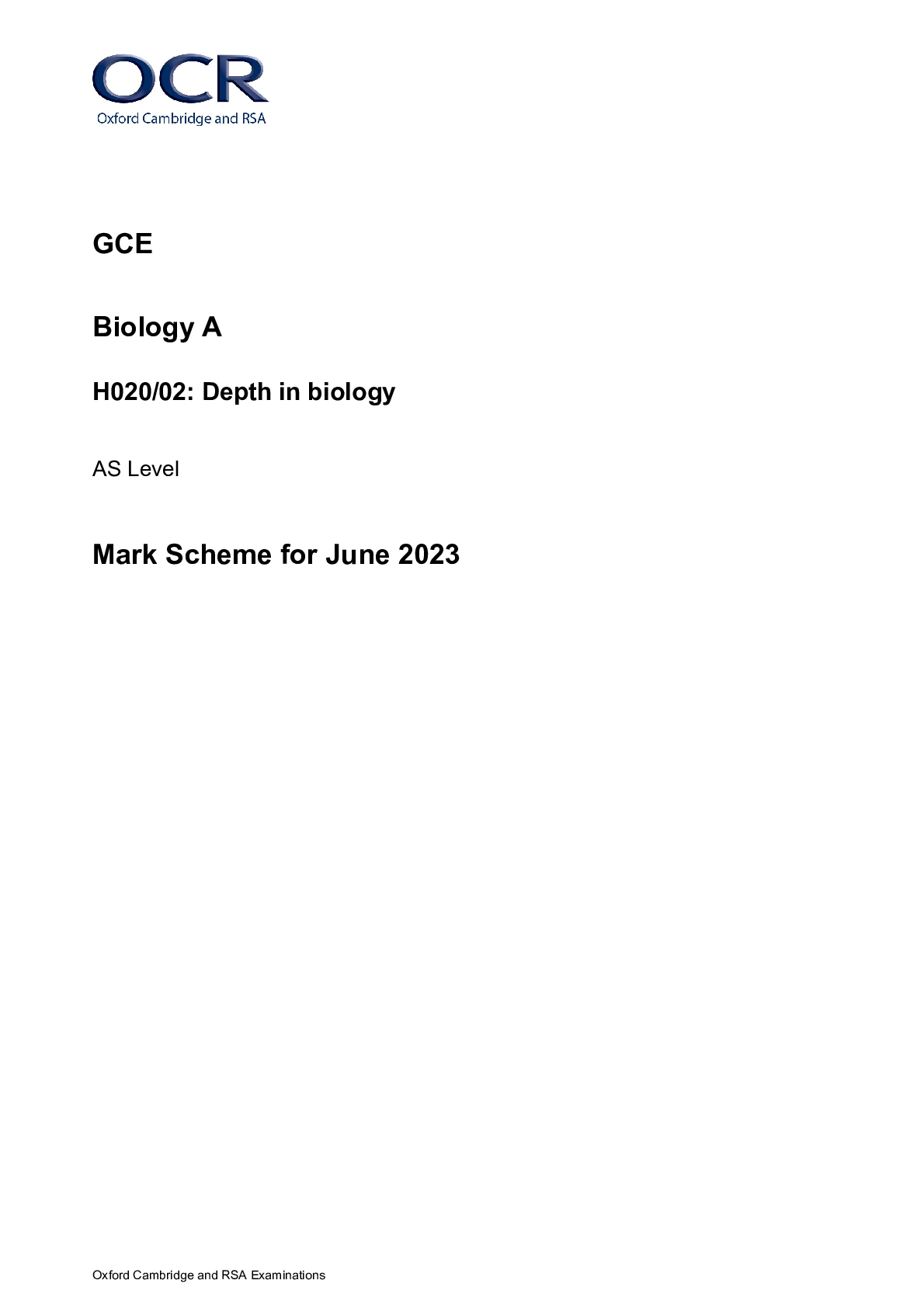Religious Studies > MARK SCHEMES > Mark Scheme (Results) Summer 2022 Pearson Edexcel GCSE In Religious Studies B (1RB0) Paper 1: Area (All)
Mark Scheme (Results) Summer 2022 Pearson Edexcel GCSE In Religious Studies B (1RB0) Paper 1: Area of Study 1 – Religion and Ethics Option 1B: Christianity Edexcel and BTEC Qualifications
Document Content and Description Below
Mark Scheme (Results) Summer 2022 Pearson Edexcel GCSE In Religious Studies B (1RB0) Paper 1: Area of Study 1 – Religion and Ethics Option 1B: Christianity Edexcel and BTEC Qualifications Ed ... excel and BTEC qualifications are awarded by Pearson, the UK’s largest awarding body. We provide a wide range of qualifications including academic, vocational, occupational and specific programmes for employers. For further information visit our qualifications websites at www.edexcel.com or www.btec.co.uk. Alternatively, you can get in touch with us using the details on our contact us page at www.edexcel.com/contactus. Pearson: helping people progress, everywhere Pearson aspires to be the world’s leading learning company. Our aim is to help everyone progress in their lives through education. We believe in every kind of learning, for all kinds of people, wherever they are in the world. We’ve been involved in education for over 150 years, and by working across 70 countries, in 100 languages, we have built an international reputation for our commitment to high standards and raising achievement through innovation in education. Find out more about how we can help you and your students at: www.pearson.com/uk Summer 2022 Question Paper Log Number P71247A Publications Code 1RB0_1B_2206_MS All the material in this publication is copyright © Pearson Education Ltd 2022 General Marking Guidance • All candidates must receive the same treatment. Examiners must mark the first candidate in exactly the same way as they mark the last. • Mark schemes should be applied positively. Candidates must be rewarded for what they have shown they can do rather than penalised for omissions. • Examiners should mark according to the mark scheme not according to their perception of where the grade boundaries may lie. • There is no ceiling on achievement. All marks on the mark scheme should be used appropriately. • All the marks on the mark scheme are designed to be awarded. Examiners should always award full marks if deserved, i.e. if the answer matches the mark scheme. Examiners should also be prepared to award zero marks if the candidate’s response is not worthy of credit according to the mark scheme. • Where some judgement is required, mark schemes will provide the principles by which marks will be awarded and exemplification may be limited. • When examiners are in doubt regarding the application of the mark scheme to a candidate’s response, the team leader must be consulted. • Crossed out work should be marked UNLESS the candidate has replaced it with an alternative response. Question number Answer Reject Mark Q1 (a) AO1 3 marks Award one mark for each point identified up to a maximum of three. • The Incarnation is God becoming human (1) • The Incarnation shows Jesus is God (1) • Jesus was incarnated at his birth (1) • The Incarnation shows God’s love to humanity (1) • The Incarnation allowed God to live a human life (1). Accept any other valid response. • Lists (maximum of one mark) (3) Question number Answer Reject Mark 1(b) AO1 4 marks Award one mark for providing a belief. Award a second mark for development of the belief. Up to a maximum of four marks. • God created the universe using words (1), he created from nothing (1) • The creation of the universe shows God is all powerful (1) and only God would be able to create it (1) • The creation of the universe described in the Bible may be metaphorical (1), it may not describe exactly how it was created (1). Accept any other valid response. • Repeated belief/ development • Development that does not relate both to the belief given and to the question. (4) Question number Answer Reject Mark 1(c) AO1 5 marks Award one mark for each issue. Award further marks for each development of the issue up to a maximum of four marks. Award one further mark for any relevant source of wisdom or authority. • Evil shows that God might not be loving (1), it is an essential characteristic that God should have (1) ‘The Lord is compassionate and gracious, slow to anger, abounding in love’ (Psalm 103:8) (1) • A loving God would not let his children suffer (1) ‘the Lord’s love is with those who fear him’ (Psalm 103:17) (1) the problem highlights that innocent people suffer (1) • It causes issues as it might show God lacks power (1). God cannot be God if he is unable to protect humanity from harm (1) ‘Great is our Lord and mighty in power; his understanding has no limit.’ (Psalm 147:5) (1). Accept any other valid response. • Repeated issue / development • Development that does not relate both to the issue given and to the question • Reference to a source of wisdom that does not relate to the issue given. (5) Question number Indicative content Mark 1(d) AO2 12 marks, SPaG 3 marks Candidates must underpin their analysis and evaluation with knowledge and understanding. Candidates will be required to demonstrate thorough knowledge and understanding as well as accuracy of religion and belief when responding to the question and in meeting AO2 descriptors. AO2 Arguments for the statement: • The Church teaches that the Trinity is God that there is one God, and thus this must be not only the easy way, but the only way to understand the nature of God • The three Persons of the Trinity all show something unique about God, which means that as unity, in the Trinity, God is shown in a way that each Person alone could not • Christians believe that the three Persons of the Trinity are shown in the Bible and thus makes it easy to understand God. Arguments against the statement: • Some would argue that as God is ineffable it is not easy to understand God and that the idea of three Persons and yet one God makes it more difficult to understand God, rather than easier • The Articles of Faith state ‘There is but one living and true God, everlasting, without body, parts, or passions; of infinite power, wisdom, and goodness.’ Thus it can be argued it is easier to understand God as one rather than the three Persons of the Trinity • Some Christians teach that the Trinity is a mystery, that it is not meant to be understood, the Catechism of the Catholic Church says ‘The mystery of the Most Holy Trinity is the central mystery of the Christian faith and of Christian life’ (261). Accept any other valid response. Candidates who do not consider different viewpoints within the religious tradition or non-religious viewpoints (as instructed in the question) cannot achieve marks beyond Level 2. (15) Level Mark Descriptor 0 No rewardable response. Level 1 1–3 • Information/issues are identified and make superficial connections among a limited range of elements in the question, underpinned by isolated elements of understanding of religion and belief. • Judgements are supported by generic arguments to produce a conclusion that is not fully justified. Level 2 4–6 • Superficial connections are made among many, but not all, of the elements in the question, underpinned by a limited understanding of religion and belief. • Judgements of a limited range of elements in the question are made. Judgements are supported by an attempt to appraise evidence, much of which may be superficial, leading to a conclusion that is not fully justified. Level 3 7–9 • Deconstructs religious information/issues, leading to coherent and logical chains of reasoning that consider different viewpoints. These are underpinned by an accurate understanding of religion and belief. Connections are made among many, but not all, of the elements in the question. • Constructs coherent and reasoned judgements of many, but not all, of the elements in the question. Judgements are supported by the appraisal of evidence, some of which may be superficial, leading to a partially justified conclusion. Level 4 10–12 • Critically deconstructs religious information/issues, leading to coherent and logical chains of reasoning that consider different viewpoints. These are underpinned by a sustained, accurate and thorough understanding of religion and belief. Connections are made among the full range of elements in the question. • Constructs coherent and reasoned judgements of the full range of elements in the question. Judgements are fully supported by the comprehensive appraisal of evidence, leading to a fully justified conclusion. SPaG Marks Descriptors 0 marks No marks awarded • The candidate writes nothing. • The candidate’s response does not relate to the question. • The candidate’s achievement in SPaG does not reach the threshold performance level, for example errors in spelling, punctuation and grammar severely hinder meaning. 1 mark Threshold performance • Candidates spell and punctuate with reasonable accuracy. • Candidates use rules of grammar with some control of meaning and any errors do not significantly hinder meaning overall. • Candidates use a limited range of specialist terms as appropriate. 2 marks Intermediate performance • Candidates spell and punctuate with considerable accuracy. • Candidates use rules of grammar with general control of meaning overall. • Candidates use a good range of specialist terms as appropriate. 3 marks High performance • Candidates spell and punctuate with consistent accuracy. • Candidates use rules of grammar with effective control of meaning overall. • Candidates use a wide range of specialist terms as appropriate. Question number Answer Reject Mark 2(a) AO1 3 marks Award one mark for each point identified up to a maximum of three. • Many Christians teach that sexual relationships are a gift from God (1) • Most Christians teach that they should only take place within marriage (1) • Some Christians regard sexual relationships before marriage as sinful (1) • Some Christians recognise same sex sexual relationships as acceptable (1) • All Christians maintain that adultery is wrong (1). Accept any other valid response. • Lists (maximum of one mark) (3) Question number Answer Reject Mark 2(b) AO1 4 marks Award one mark for providing a teaching. Award a second mark for development of the teaching. Up to a maximum of four marks. • Most Christians believe that men and women should have equal roles in the family (1), in Genesis 1 it shows they were created at the same time (1) • Some Christians believe that the roles of men and women in the family should be equal yet different (1) ‘ male and female he created them’ (Genesis 1:27) (1) • Some Christians maintain that men should be in charge of the family (1) ‘ Wives, submit yourselves to your own husbands as you do to the Lord. (Ephesians 5:22) (1). • Repeated teaching / development • Development that does not relate both to the teaching given and to the question. (4) Accept any other valid response. Question number Answer Reject Mark 2(c) AO1 5 marks Award one mark for each attitude. Award further marks for each development of the attitude up to a maximum of four marks. Award one further mark for any relevant source of wisdom or authority. • Some Christians may say it is contrary to God’s will (1) thus anything which is contraceptive in marriage is ‘intrinsically wrong’ (Humanae Vitae) (1) • Some Christians believe that they should not use artificial contraception (1) as it goes against God’s plan for humanity (1), they were made to ‘ be fruitful and increase in number’ (Genesis 9:7) • Some Christians allow the use of artificial contraception (1) as they feel it is up to a person’s own conscience as to whether they wish to use it (1). Lambeth Conference resolution 115 said ‘the responsibility for deciding upon the number and frequency of children has been laid by God upon the consciences of parents everywhere’ (1). Candidates who do not consider different attitudes within Christianity cannot be awarded more than 3 marks. Accept any other valid response. • Repeated attitude/ development • Development that does no [Show More]
Last updated: 2 years ago
Preview 1 out of 21 pages
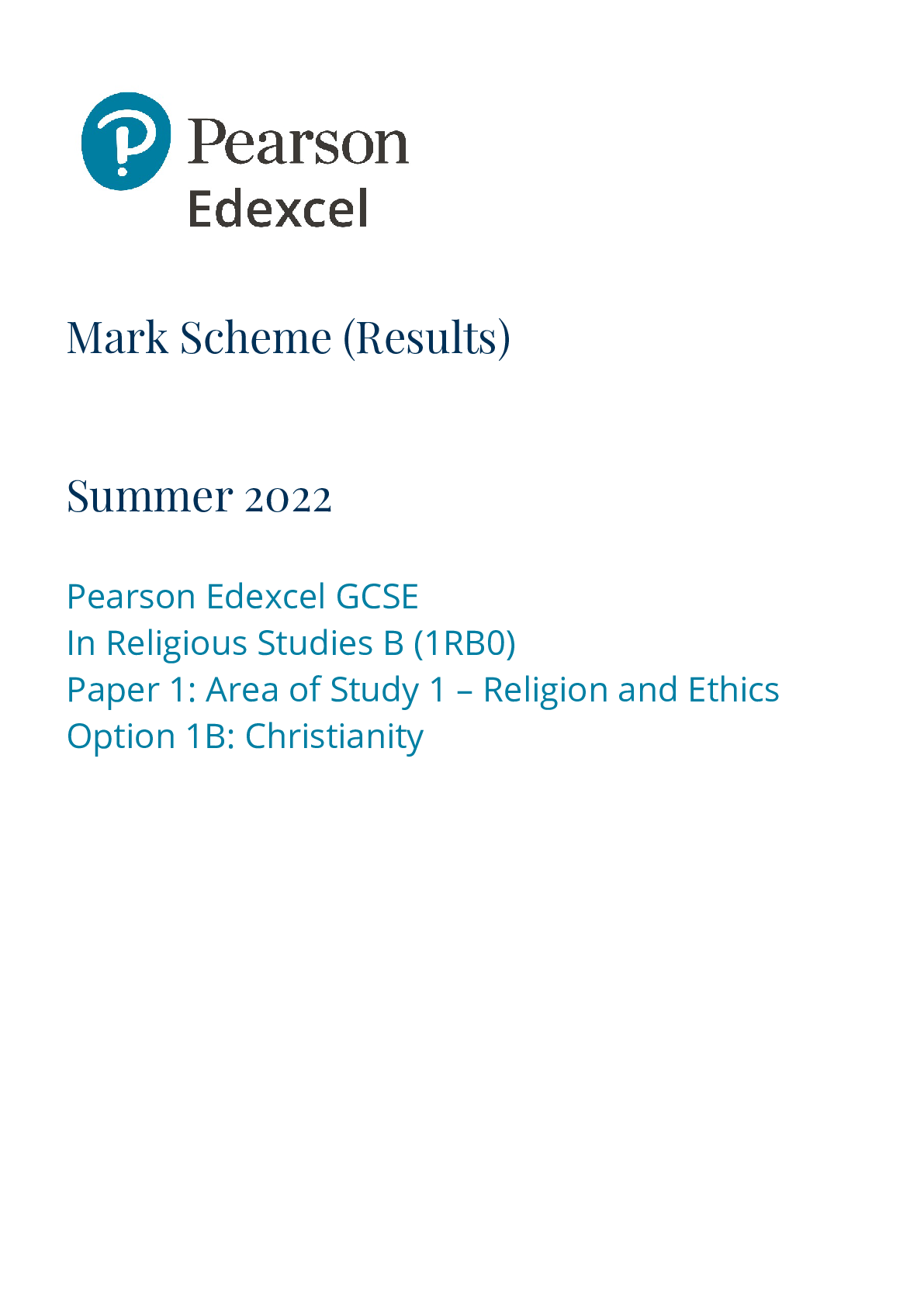
Buy this document to get the full access instantly
Instant Download Access after purchase
Buy NowInstant download
We Accept:

Reviews( 0 )
$8.00
Can't find what you want? Try our AI powered Search
Document information
Connected school, study & course
About the document
Uploaded On
Apr 03, 2023
Number of pages
21
Written in
All
Additional information
This document has been written for:
Uploaded
Apr 03, 2023
Downloads
0
Views
163

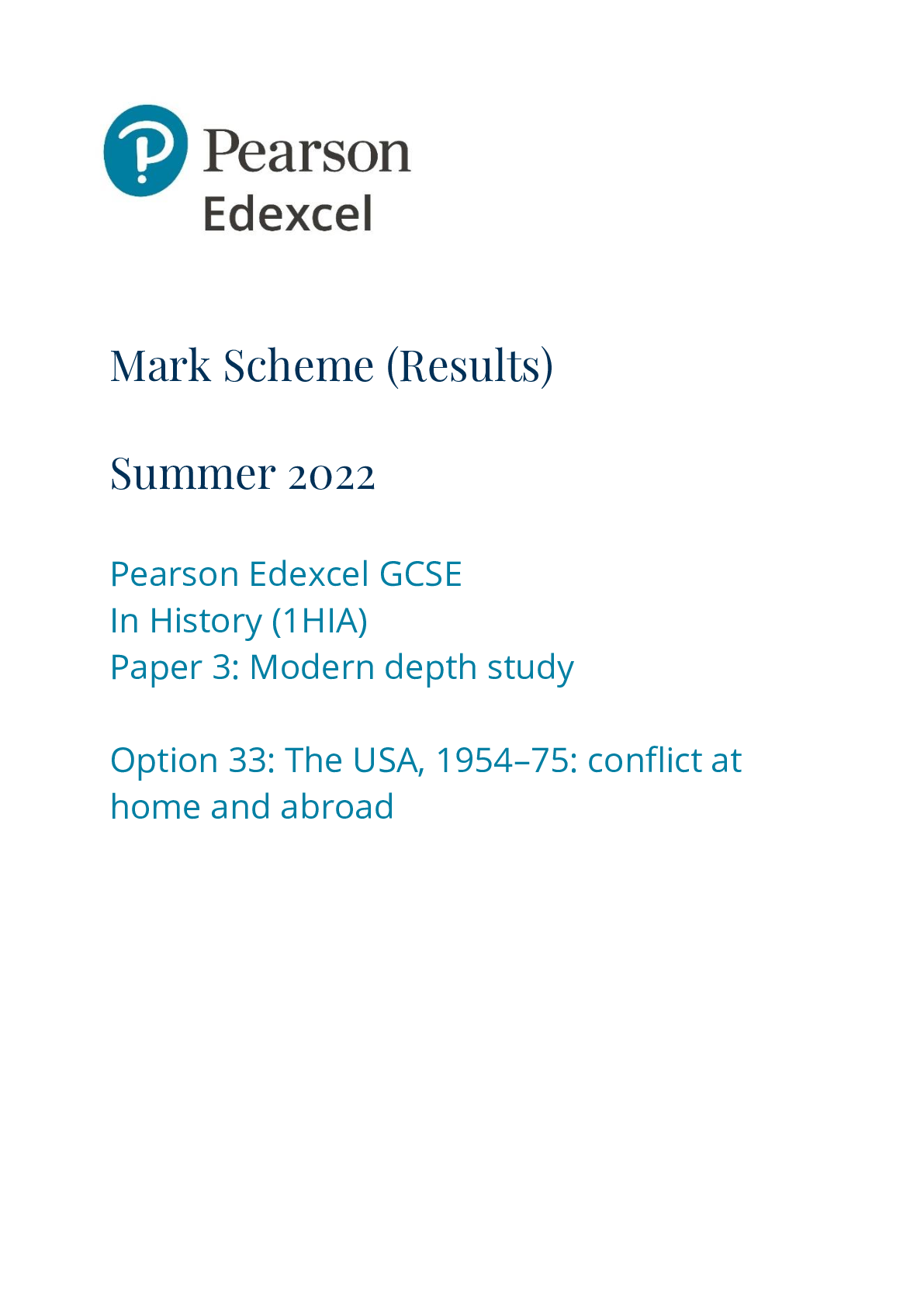
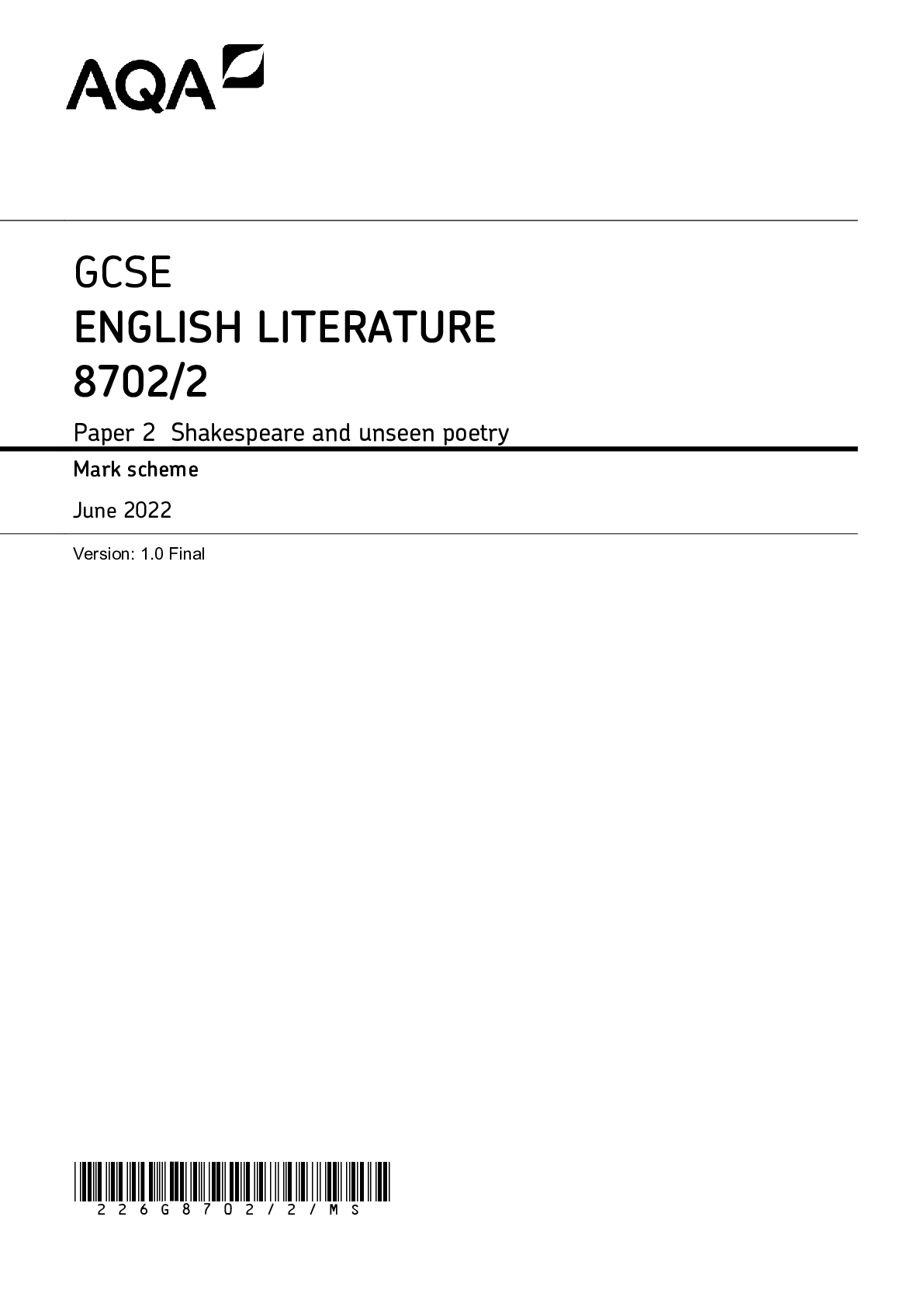
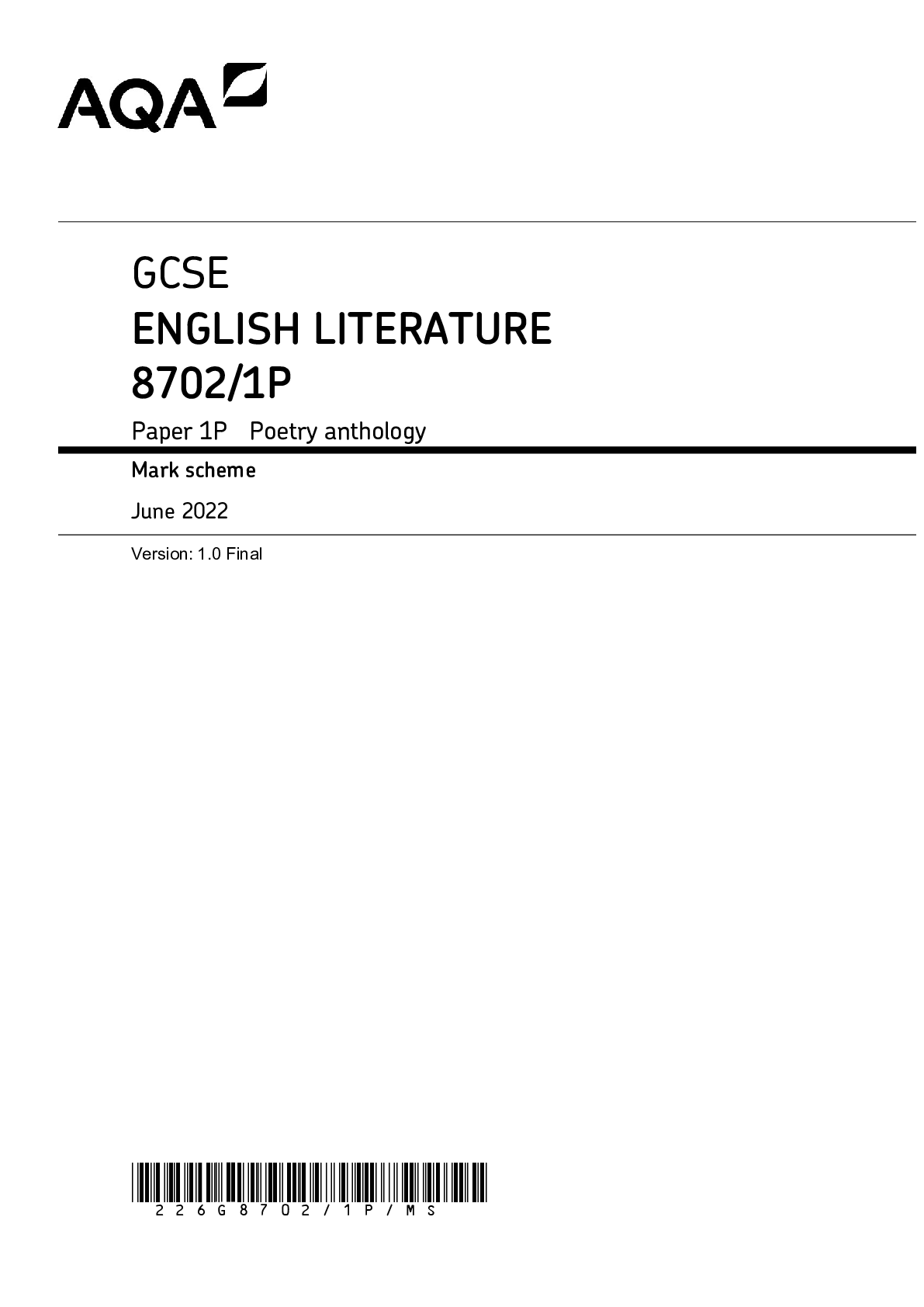
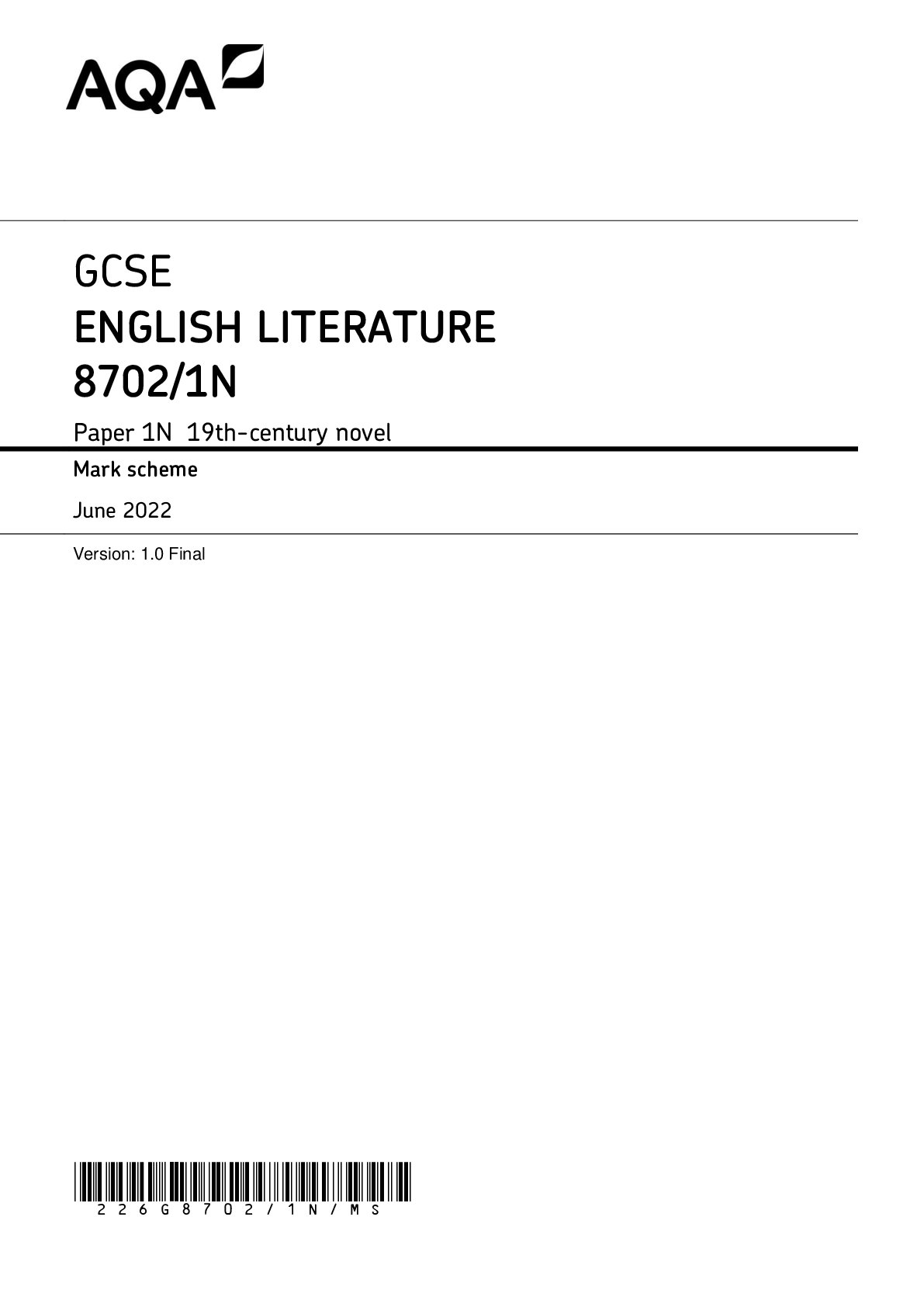
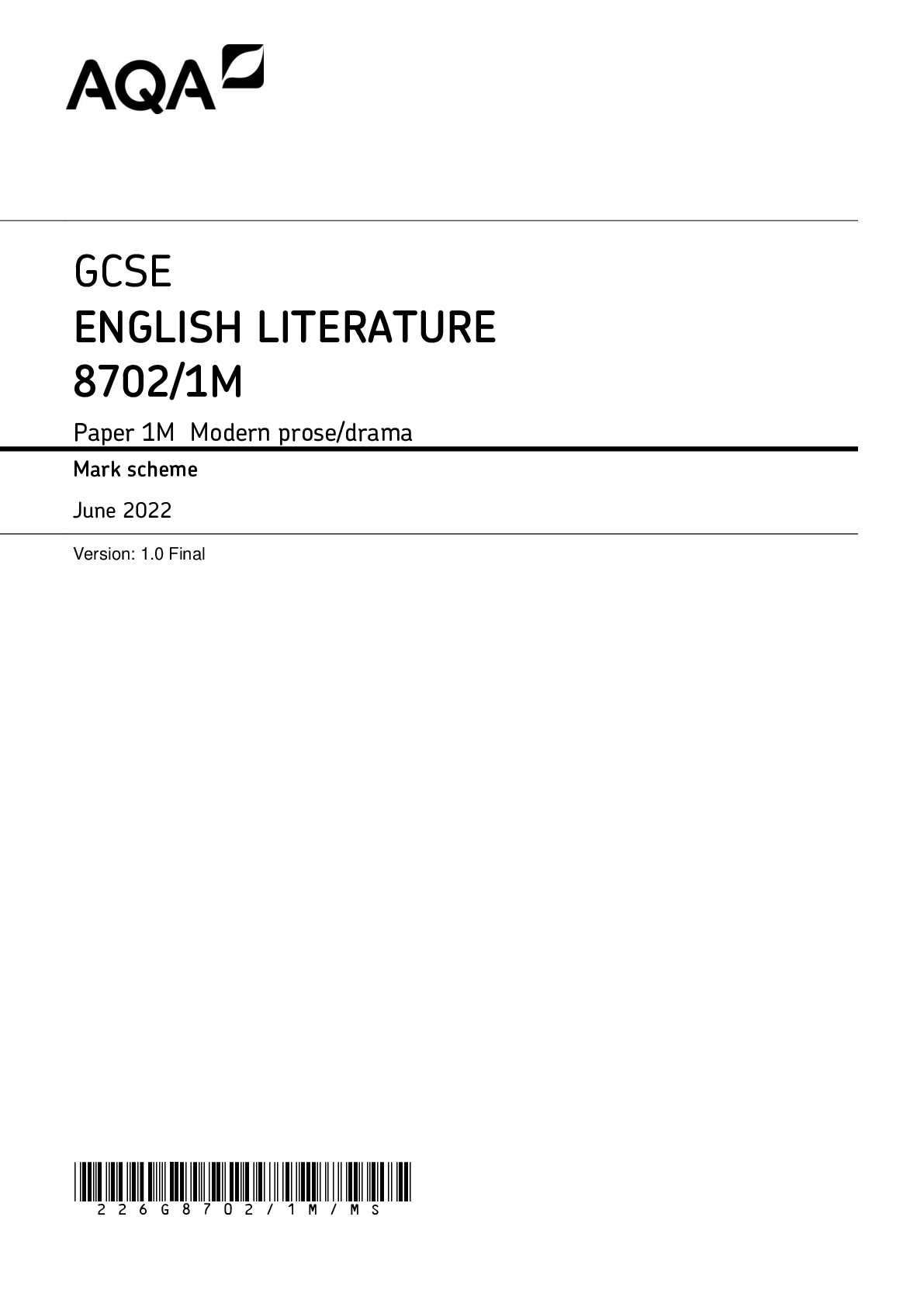
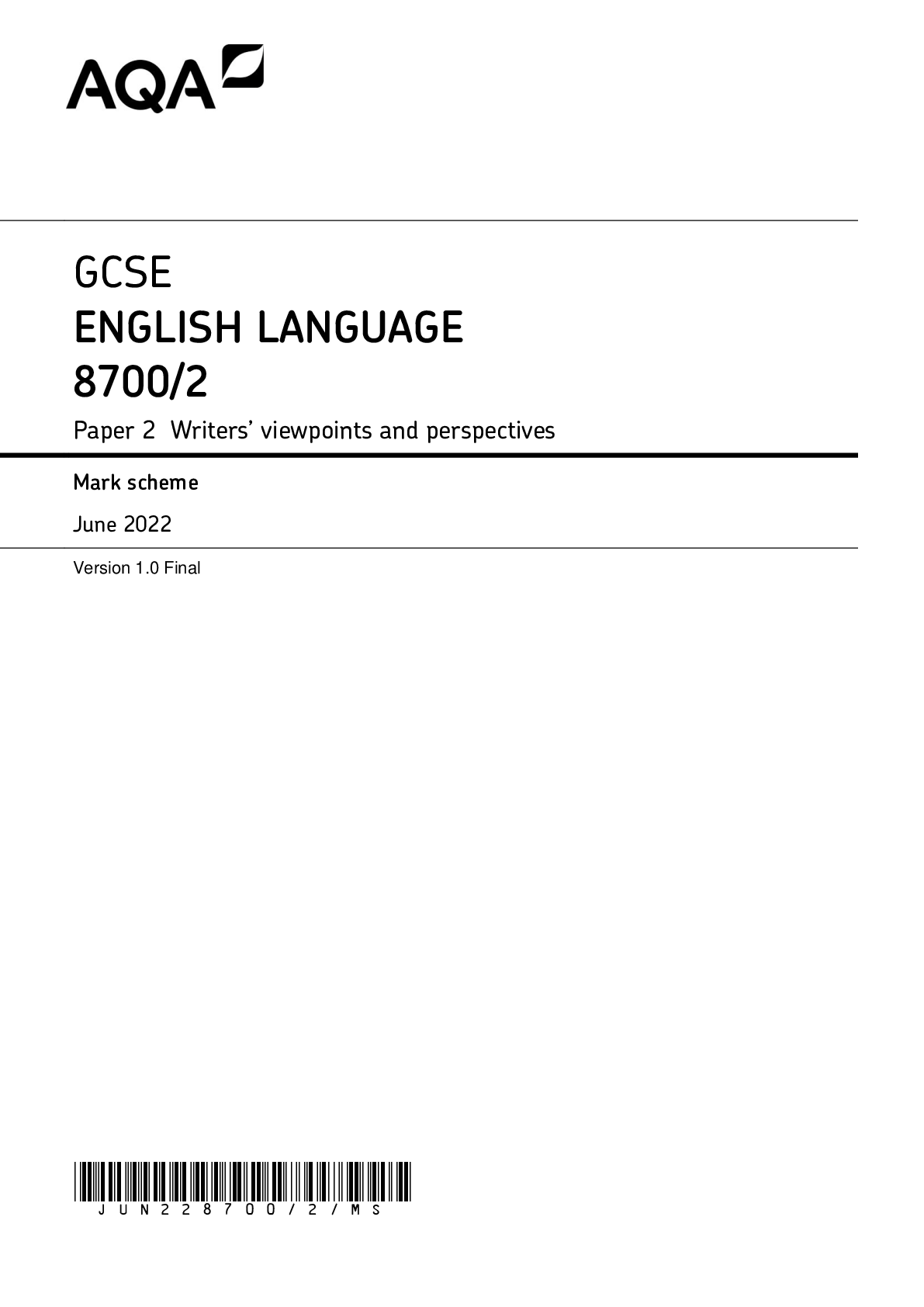
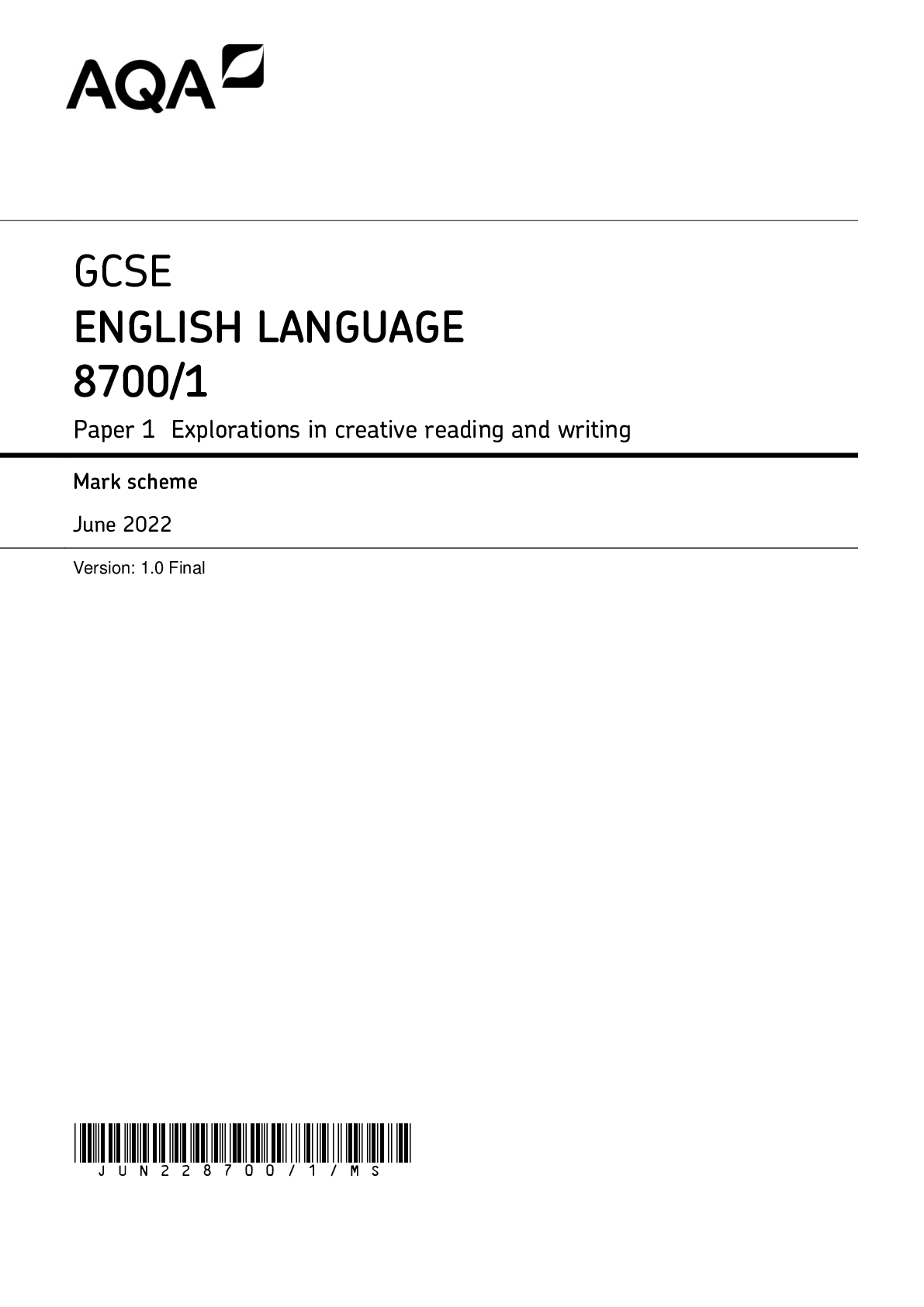
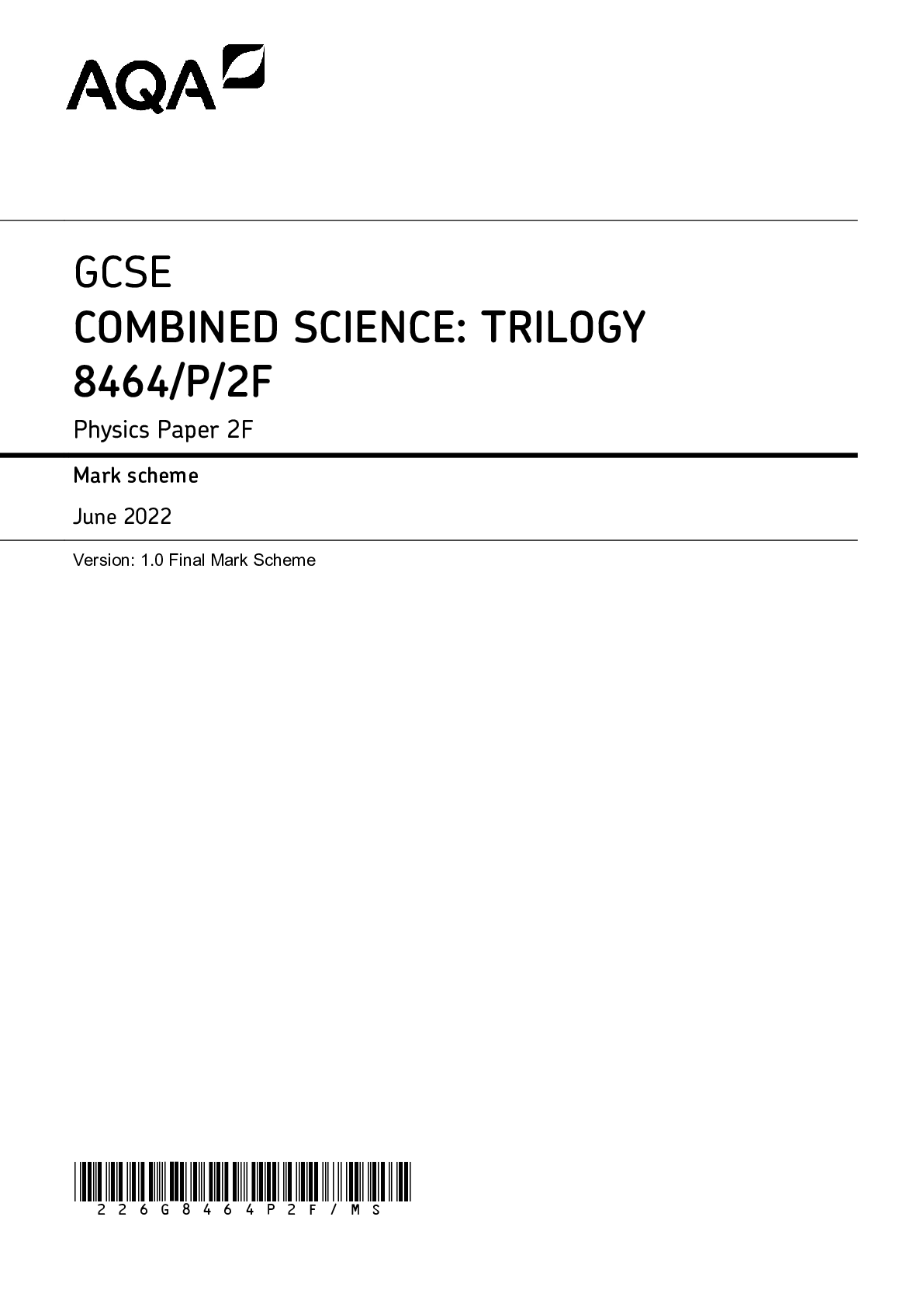
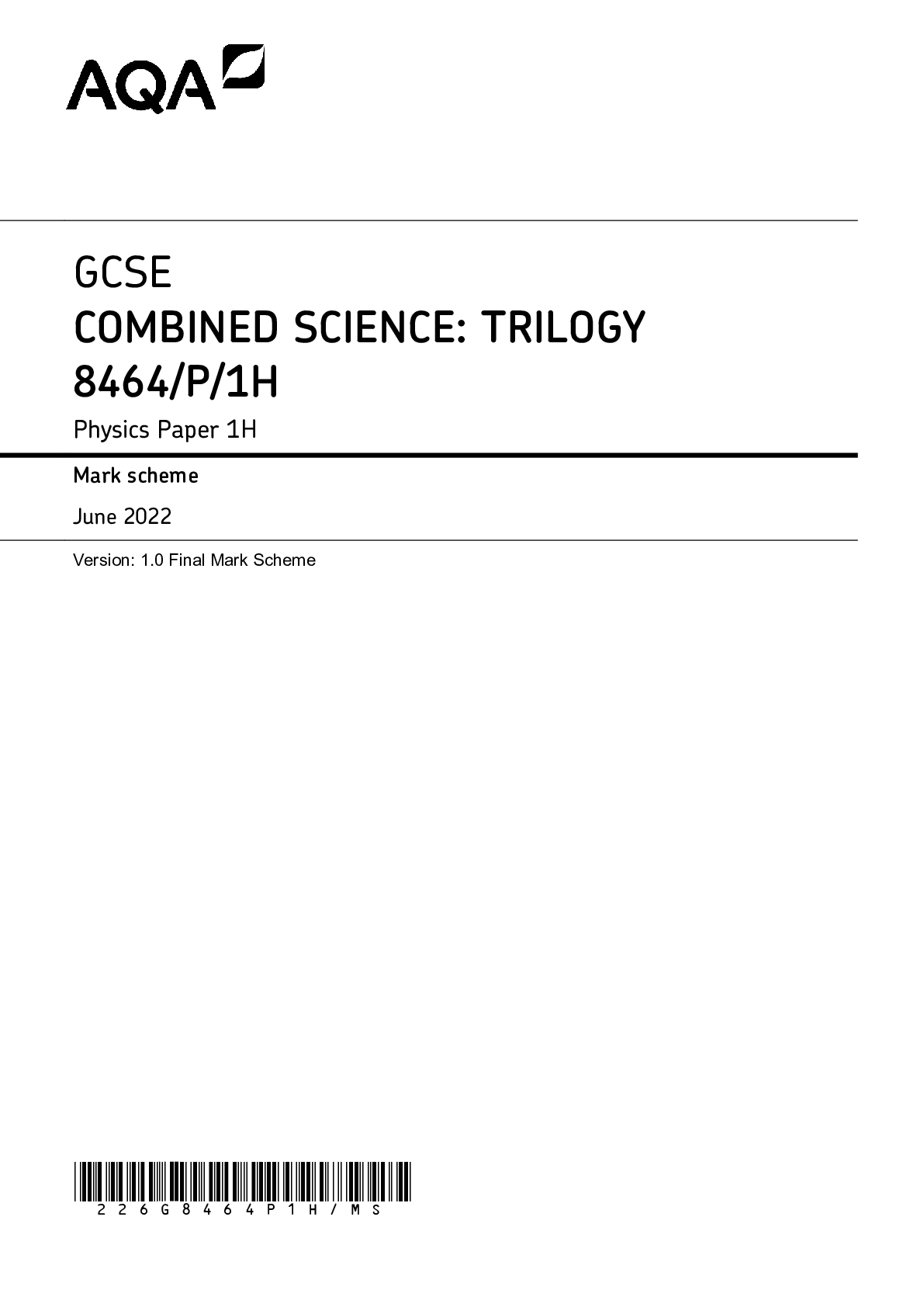
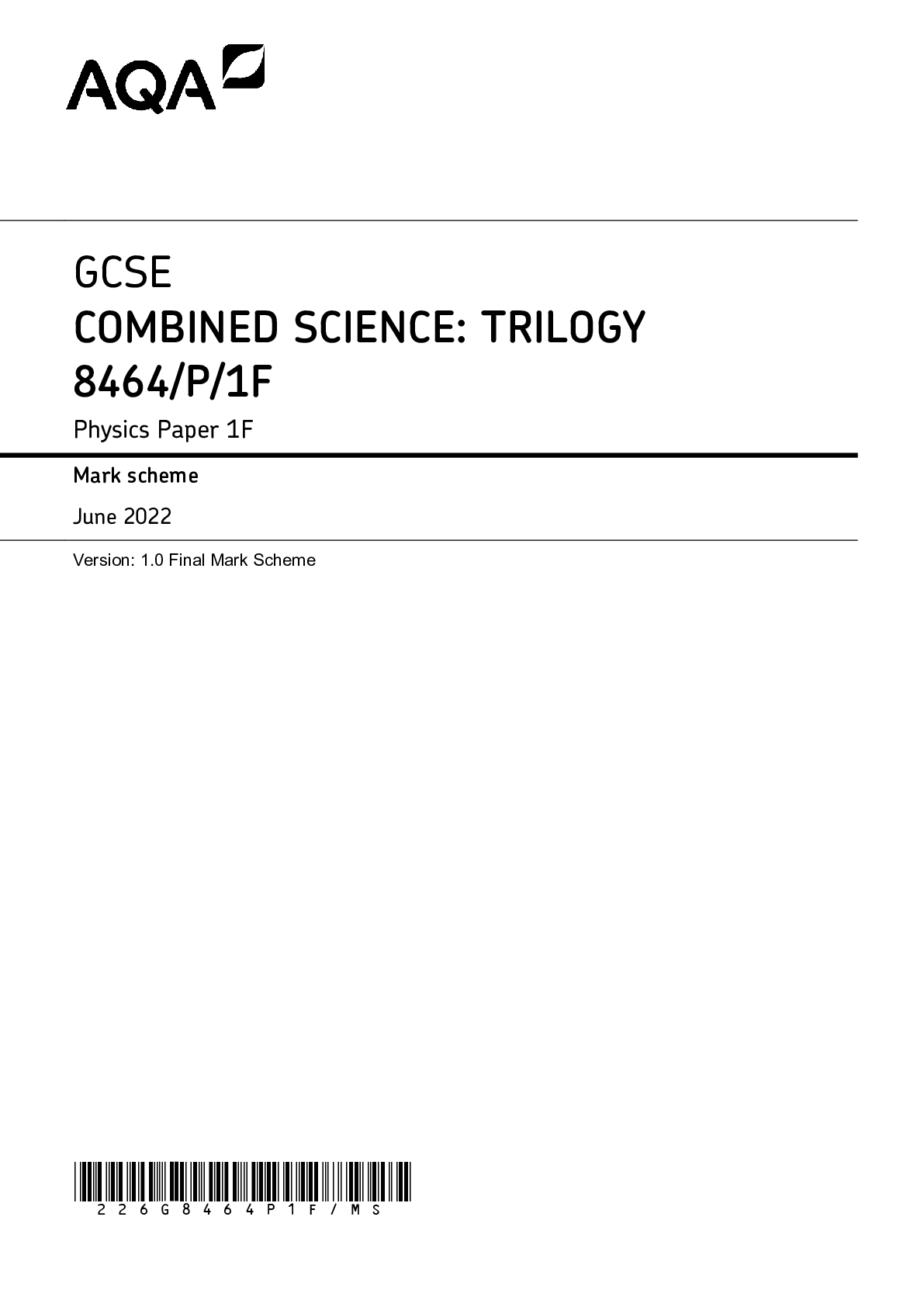
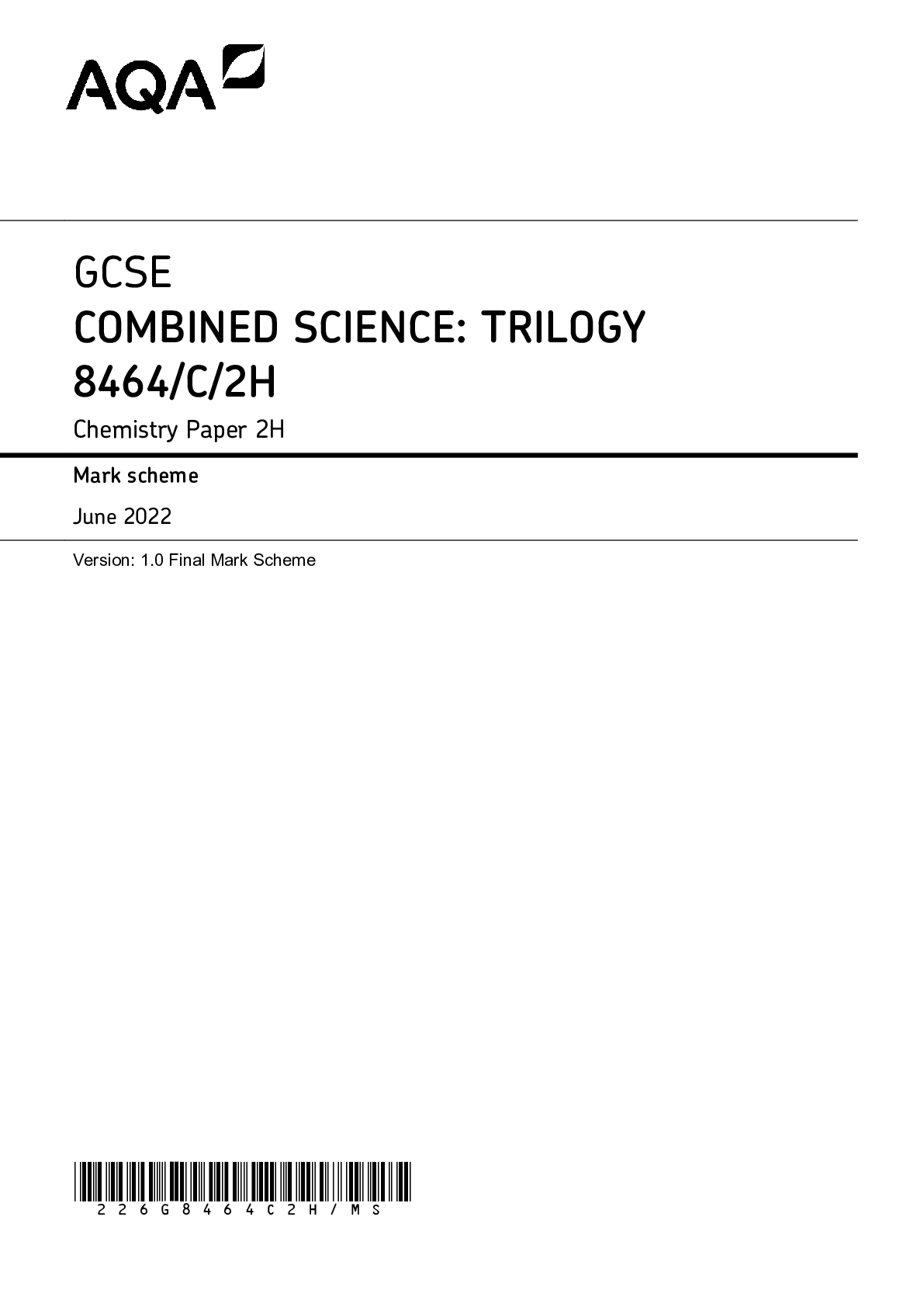


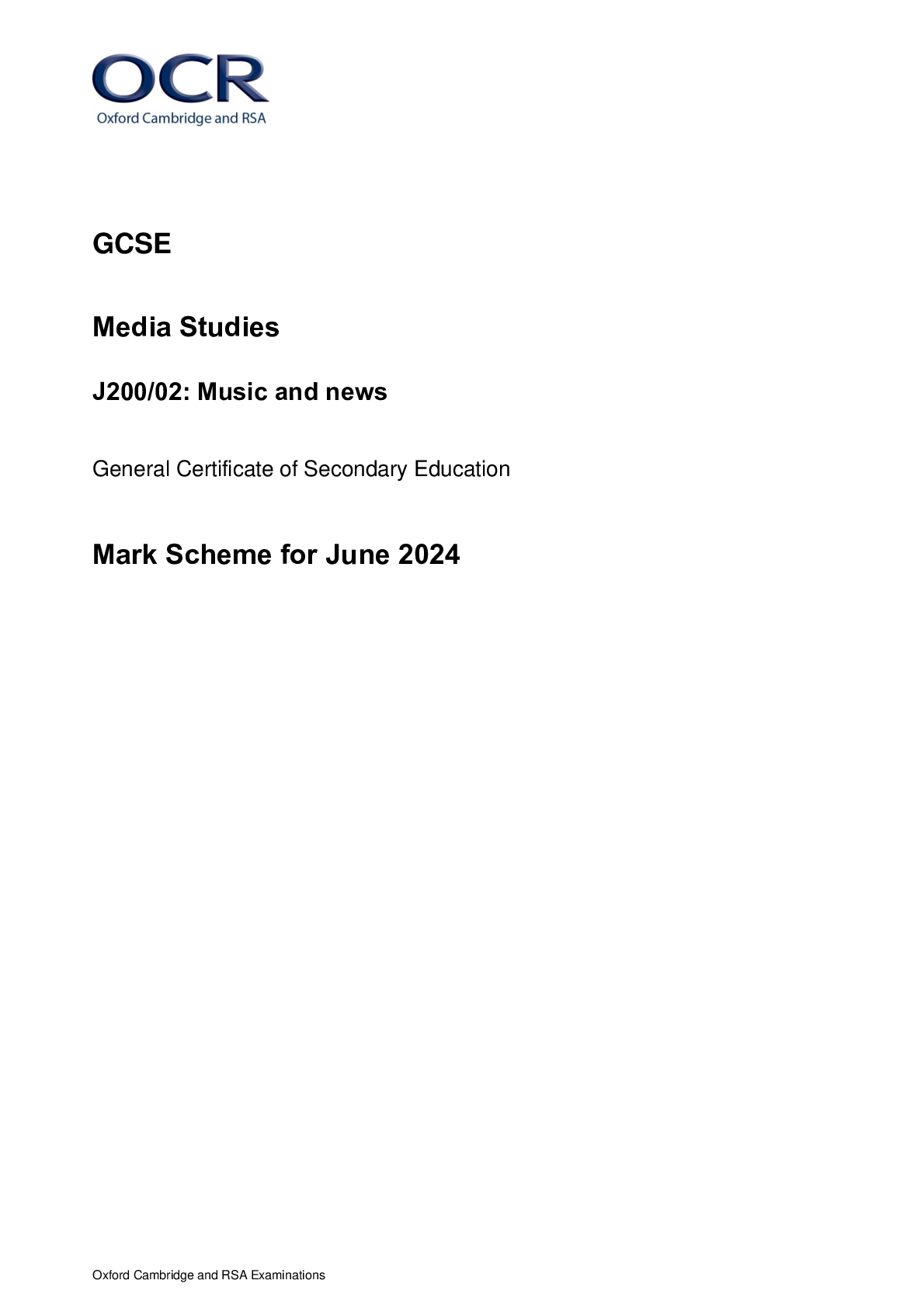
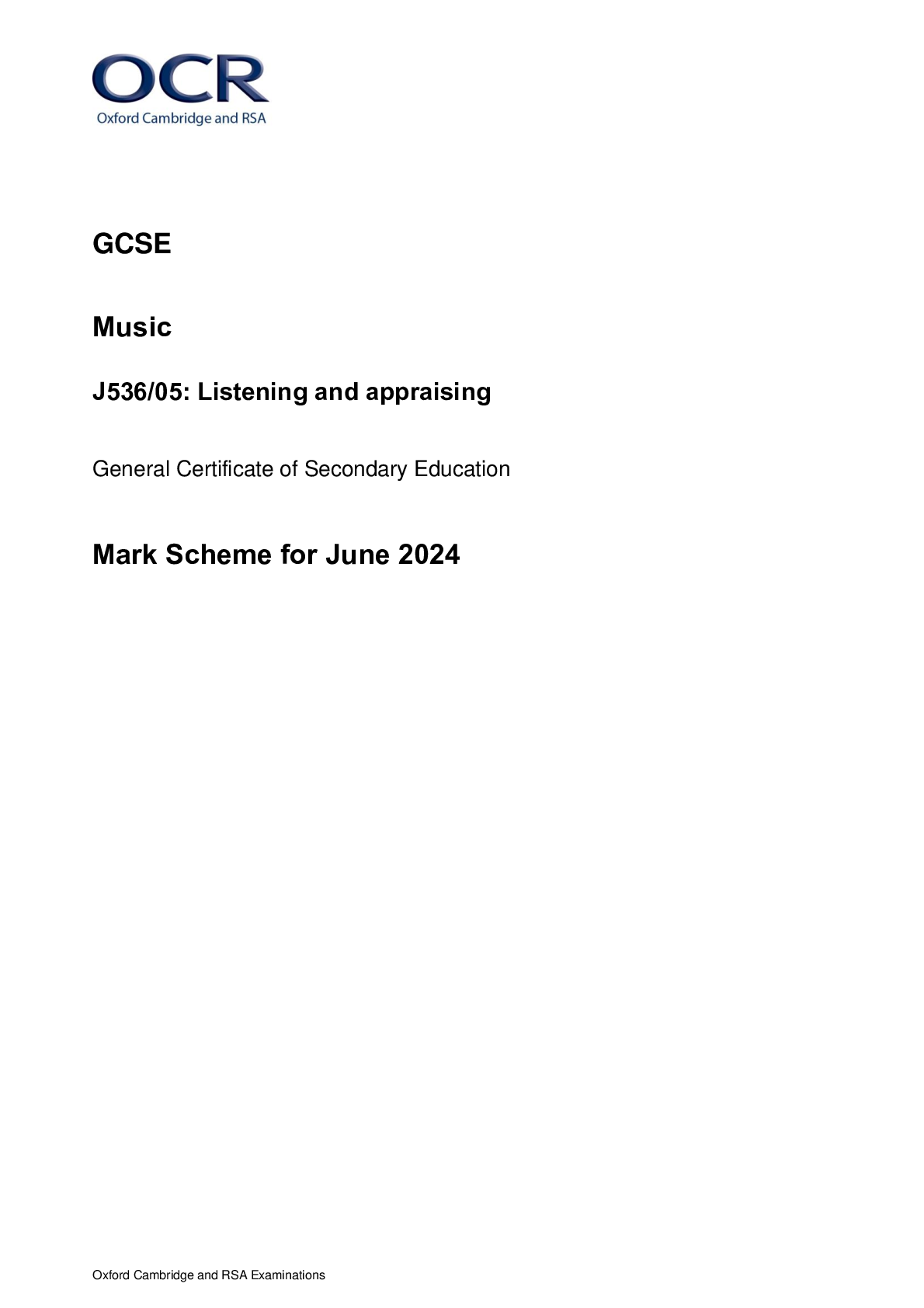
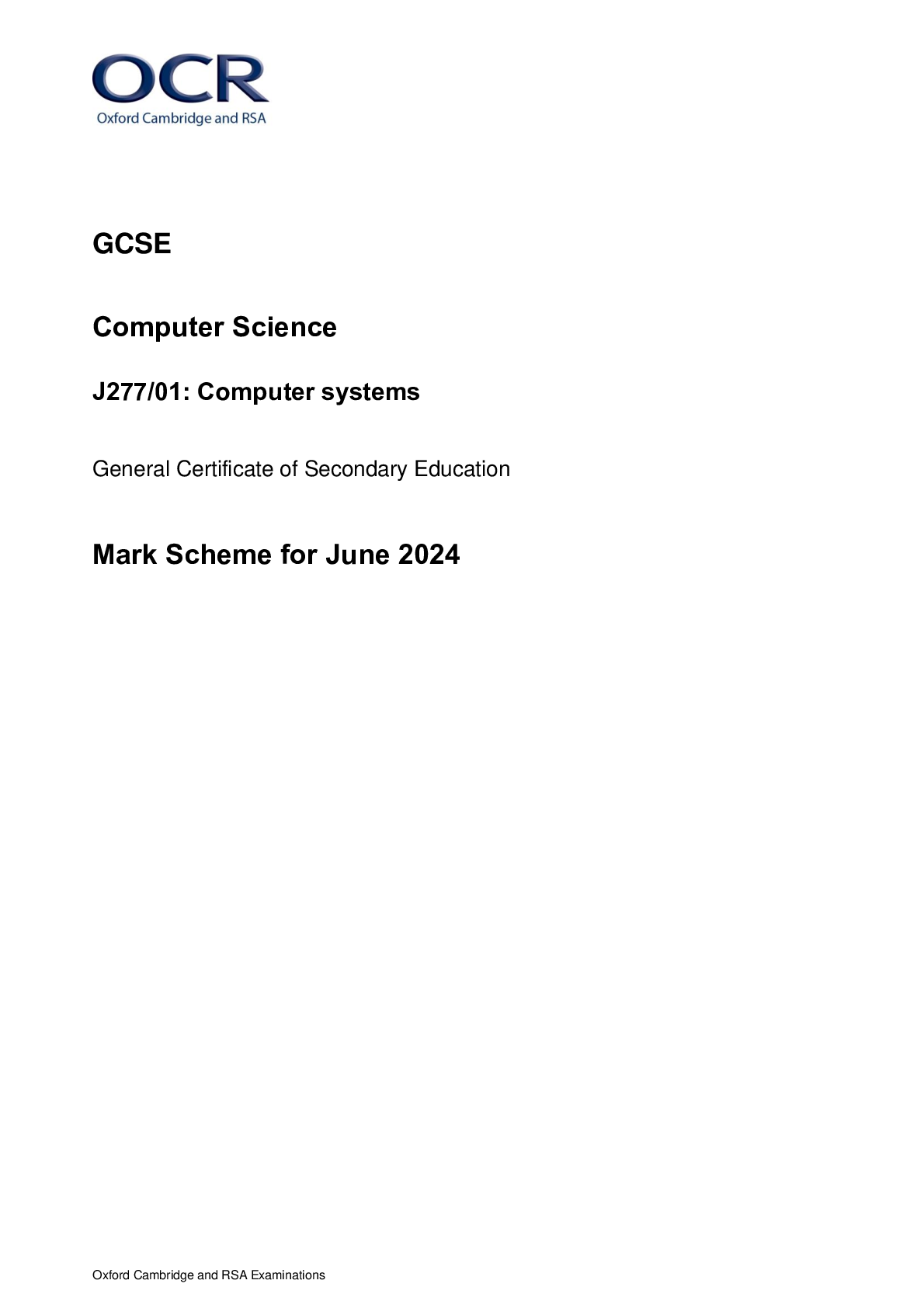
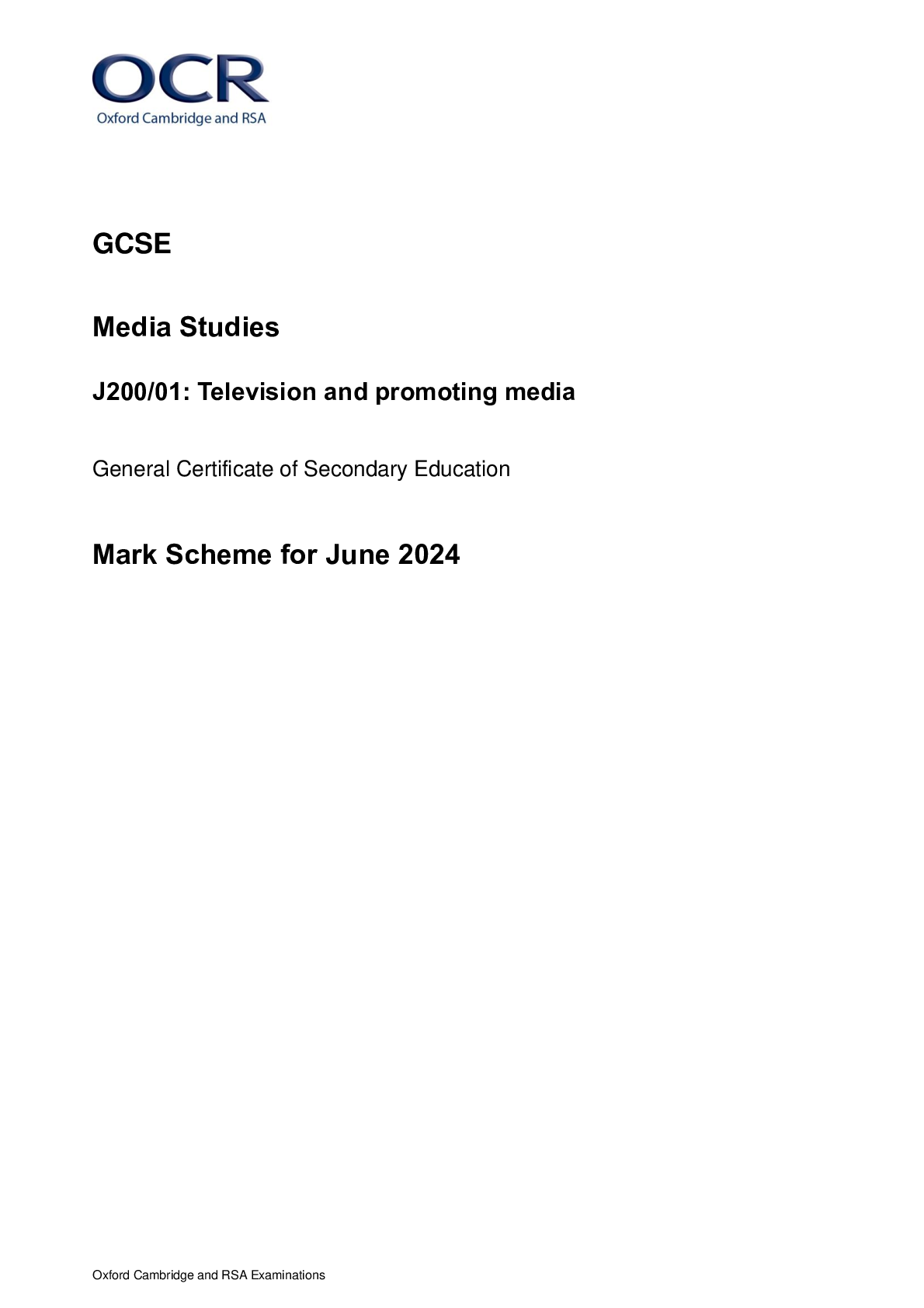
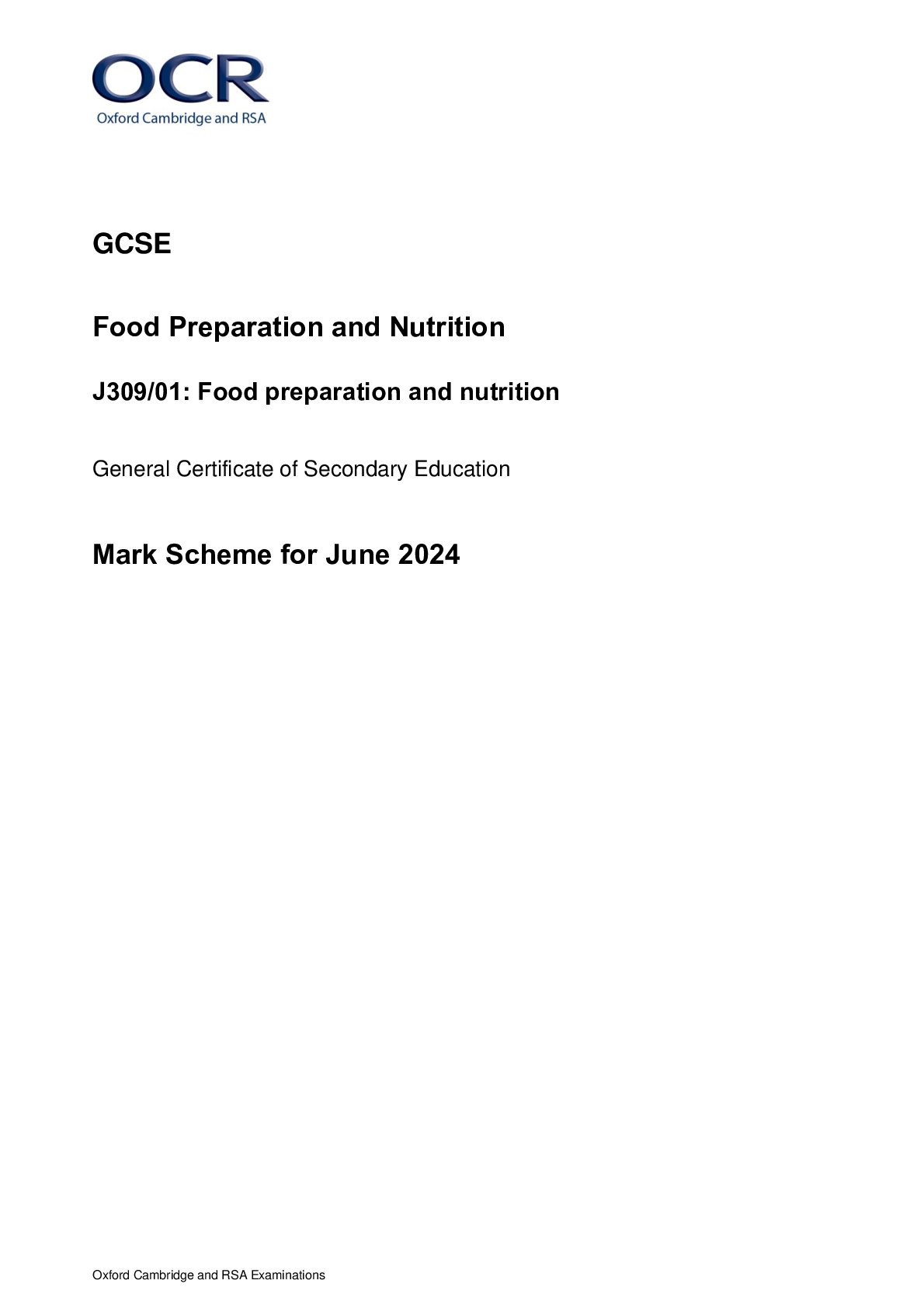
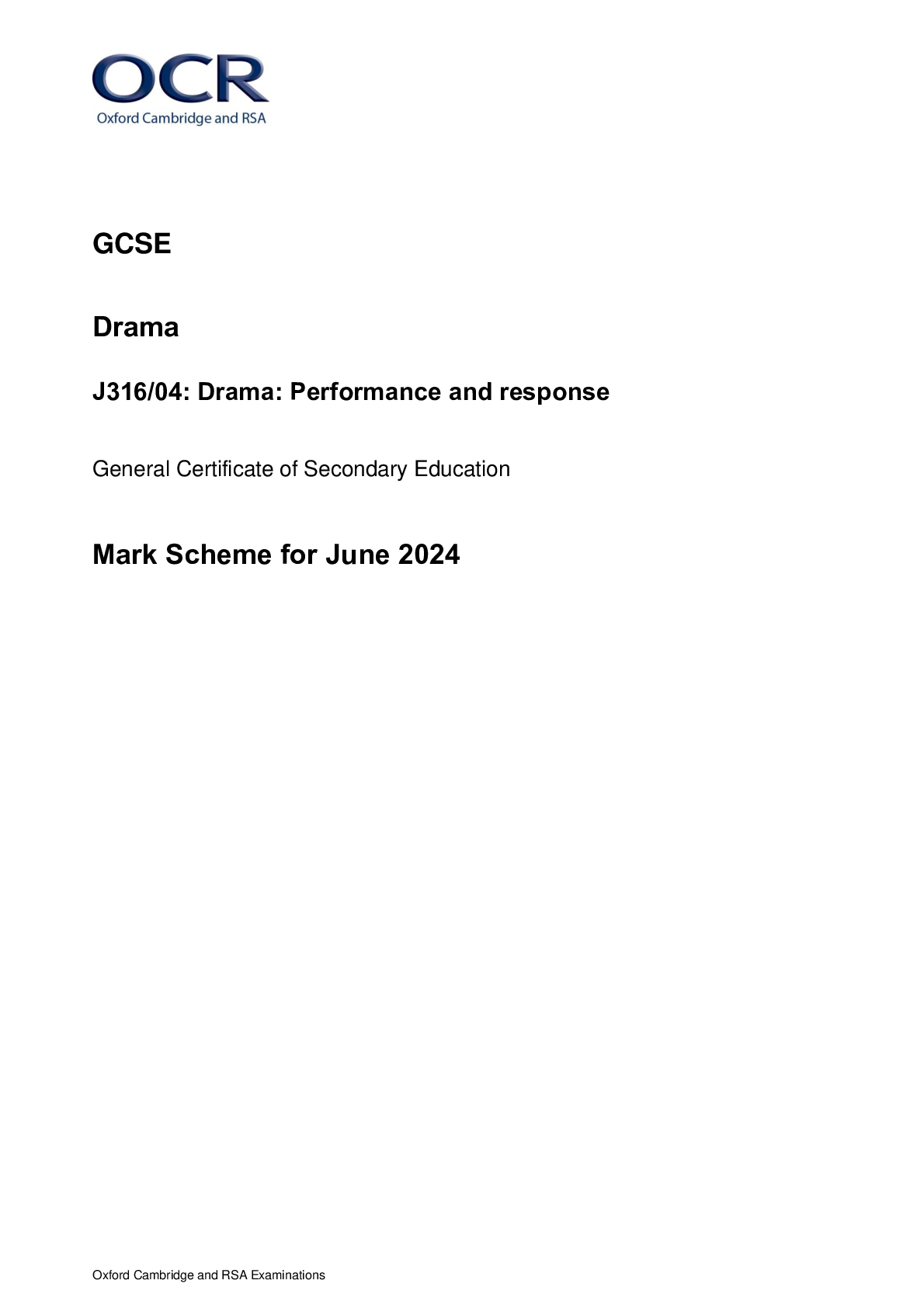
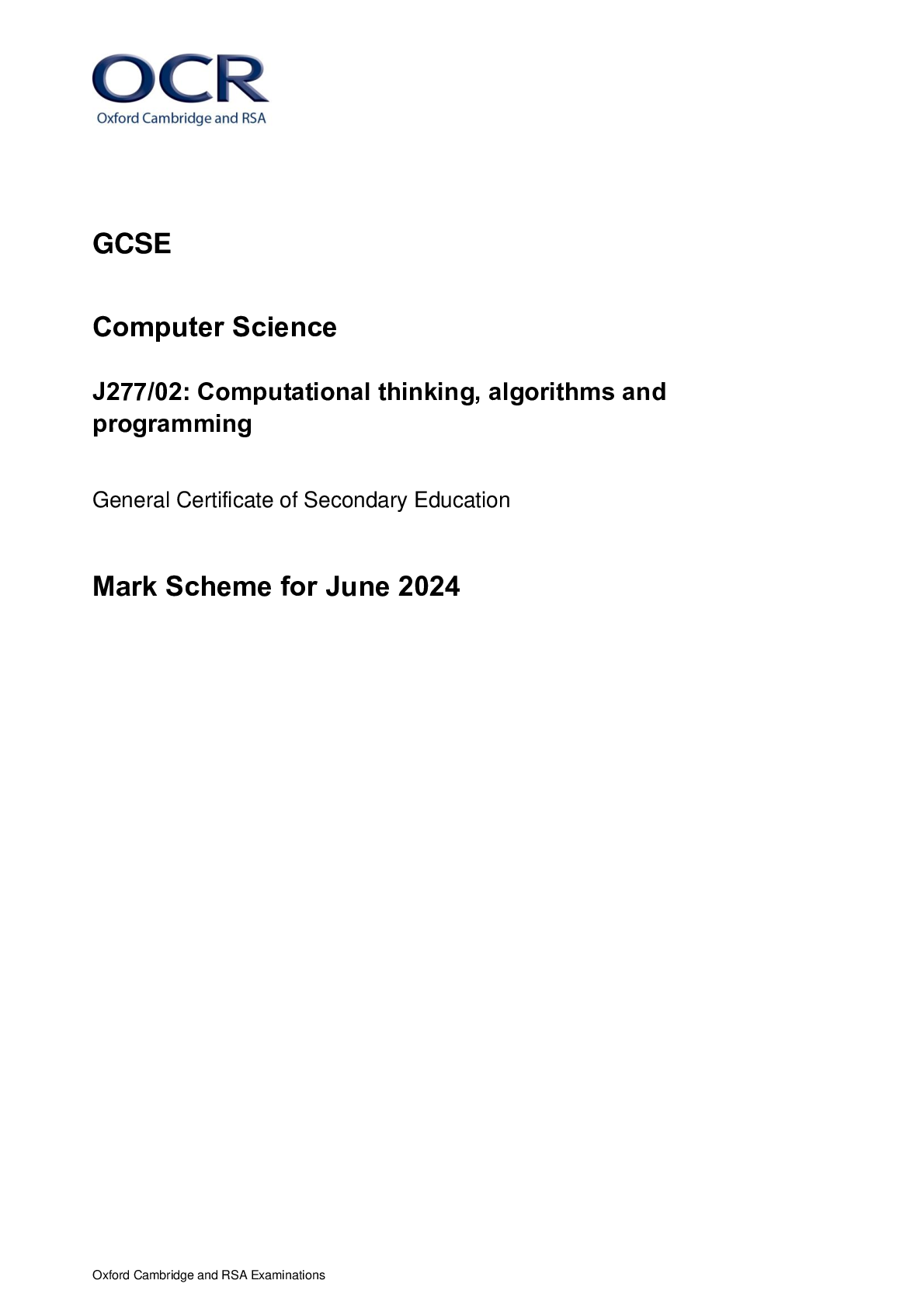
.png)

